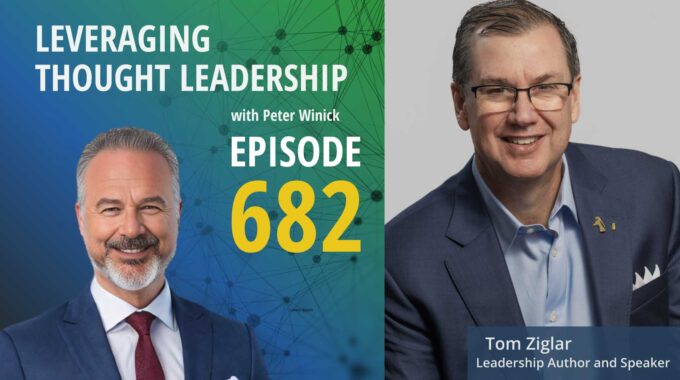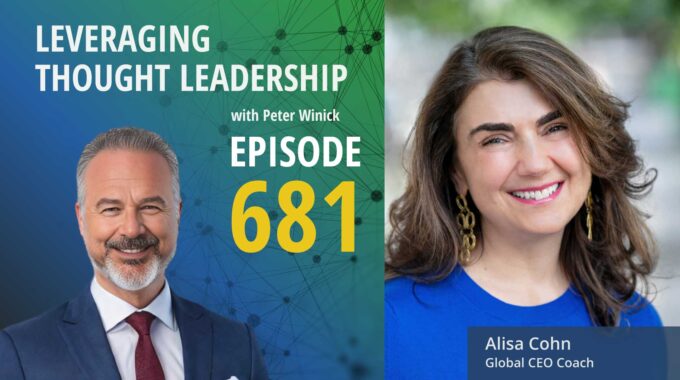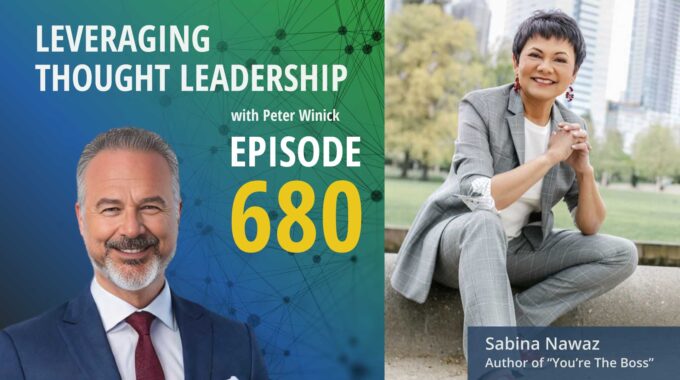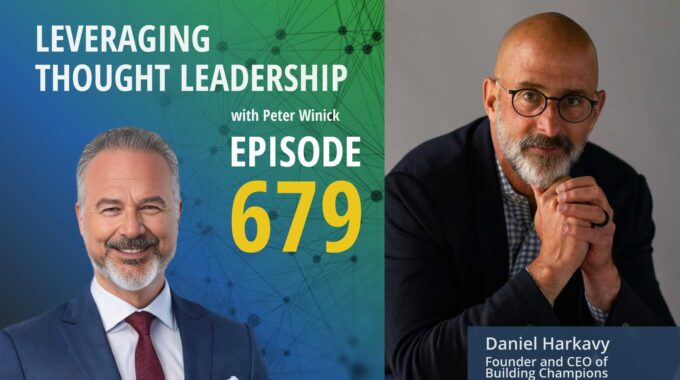How AI, Programs, and Trust Turn Ideas into a Life-Changing Business This episode explores how…
Thought Leadership Authorship and Better Content Tips | Steve Anderson | 213
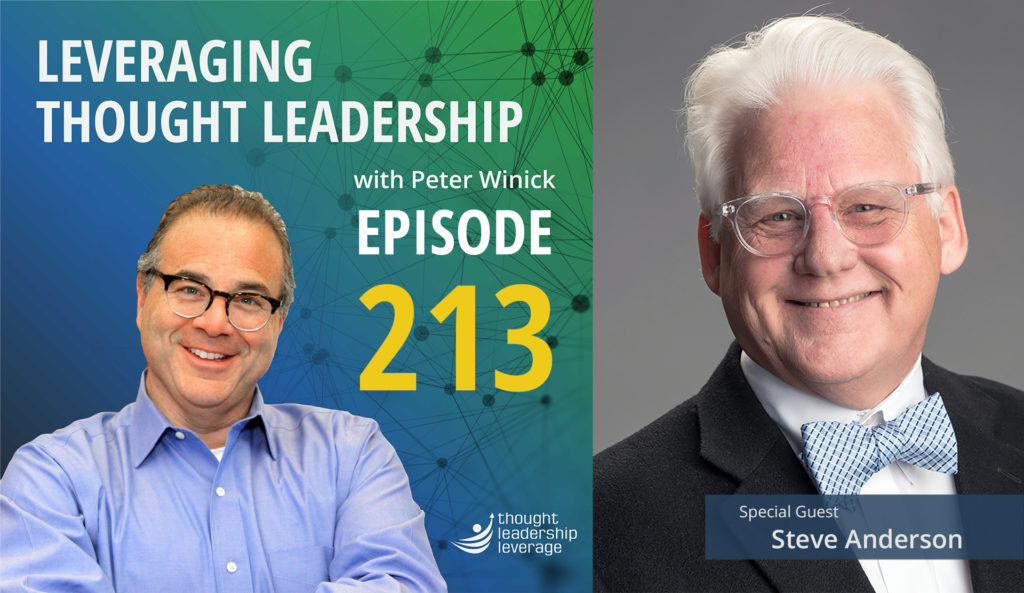
The Best Way to Approach Thought Leadership Authorship
An interview with Steve Anderson about his new book, the difficulties it took to see it go to print, and how being published has changed his speakership career.
Today’s guest is Steve Anderson, sought-after speaker, influencer, and author of the widely anticipated book, The Bezos Letters. Steve has a Masters in Law, and for the last 20 years, he has crossed the nation speaking for state and national organizations, helping people make sense of rapidly changing technology, and learning how to effectively use these new tools. He talks to us about his new book, the process it took to write it, and how his book is opening new doors!
Three Key Takeaways:
- Steve’s story of going from domain expertise to national celebrity, working with Jeff Bezos, and using thought leadership to increase digital learning and online consulting.
- How people are thinking differently about business risks, and the difference between intentional risk and accidental risk.
- The ideas behind his book, and the process it took to write The Bezos Letters.
Transcript:
Peter And welcome, welcome, welcome. This is Peter Winick, I’m the founder and CEO of Thought Leadership Leverage and you’re joining us on the podcast today, which is Leveraging Thought Leadership today. My guest is Steve Anderson. Steve has spent over 35 years shaping the insurance industry through a deep understanding of emerging technologies and how businesses today in best integrate and leverage them. He’s a sought-after speaker and influencer. He’s also the author of the widely anticipated book, The Bezos Letters, which reveals 14 principles for business growth based on the ideas and patterns that emerge when he examined Jeff Bezos 21 annual letters to shareholders. He has spoken in, I think, every state in the Union a half.
Steve Anderson I have, yes.
Peter As well as other places. So welcome aboard, Steve. How are you today? Well, thank you, Peter. Thanks for having me. So every state so it’s easy to say and you spoke in both Missouri and Kansas
Steve Anderson I have, yes, and South Dakota and North Dakota.
Peter But most people don’t double Dakota. So anyway, so let let’s dive in. So you sort of come at this a little bit different than many of the folks that we have given that you’ve got this deep domain expertise. Right, to the domain expertise that you have comes from the insurance business. Correct. And then now you’ve got the Bezos piece. How did you go from sort of the domain expertise to Bezos and why did you pick insurance? Because some people struggle where they start in terms of finding a lane.
Steve Anderson Yeah. So, I mean, I started in insurance. I’ve been working in that industry for about 40 years now in various capacities, selling primarily in the distribution side. So agents are brokers last 20 years. I have been focused on how technology impacts the industry. So part of that was researching what’s coming, what to pay attention to, what agents and brokers needed to implement within their own organizations. And so I would do research, writing, speaking workshops around those topics. And in a wide range from database systems to Web sites to social platforms. Right. All kind of. I would call the normal things. A little bit of a twist, though, was also helping those agents and brokers understand how technology was potentially impacting their clients and causing insurance questions and issues. So coverage and some of those kinds of things. So that background led me to really looking probably about three or four years ago, a work group within the industry that I was a co chairman of called The Changing Nature of Risk. So we were really looking at how risk was changing. And that led me to this idea that because technology is changing so rapidly, businesses don’t have the time. They used to have to examine and look and OK, what’s this new thing going to do to us? How is it going to impact us? So, the biggest risk is actually not taking enough risk. And so that started me on a journey of looking at a company that didn’t make transitions well. And we certainly know some of those names between Kodak and BlackBerry and now Sears and I mean a whole bunch of different companies. And also, there’s companies that actually have made those transitions. Well, that led me to Amazon. That led me to really doing a deep dove into, OK, how did they do it? What’s different? Which led me to the shareholder letters. And so the book is an examination of the now 21 letters to shareholders that Jeff Bezos has written starting in 1997 and really a deep dive examination. And in through that process, I came up with what I call 14 growth principles that I believe any business can use to grow like Amazon.
Peter So clearly the principles that extracted from examining the Amazon letters have more or have a broader reach or broader application than you’re working the insurance universe is that correct?
Steve Anderson That is correct. Certainly applies to that industry, but also I believe and this is kind of the journey I realized in that. OK. These are principles that actually apply to not just businesses either, but non-profits and other types of organizations that they may be able to look at and use.
Peter Sure. So give it given that what, if anything, have you or are you going to be doing differently with your business in terms of the types of clients that you serve, in terms of how you serve them for modalities and such? So how did how does it potentially change the face of the business?
Steve Anderson Well, so one of the reasons for even considering writing a book in the first place was the ideas that I wanted to pivot to a what a wider audience. So my niche that has been very good to me, but was very narrow focused. It was insurance agents and brokers in the United States, primarily some in Canada, but primarily the United States. And I felt I had reached a plateau there in terms of both income speaking fees and things like that. You know, as well as impact and breadth and. As I you know, I’ve gotten a lot of encouragement in terms around the concept of the book and realized that it would provide me a different platform certainly from more of a keynote than a workshop speaker, as well as helping businesses think through. What does this innovation invention look like?
Peter So let me ask you something there, Steve. Let me pause you there, if I could, for a moment. Sure. So. So it sounds like there’s sort of two things going on at once here, which I love, which is, hey, you know, you’re incredibly successful in the insurance market, but it has its own limitations, its own glass ceiling, if you will. And you didn’t think there was much more to go in which, you know, lets you stay in one industry for a long time. That’s a hashtag. Good problem, but a problem. The MLS.
Steve Anderson Yes.
Peter So then you decide in order to break through that the book is going to be sort of my transition, my crossover. Right. Is that so?
Steve Anderson It was deliberate to say, yeah, it ended up being that it didn’t start that way, but absolutely ended up being that. And the book looks at, you know, experimentation, invention and innovation through the lens of risk taking. So, I’ve been able to use all of my insurance risk management background and what I’ve worked on for many years, but use it in a different way. And I think what certainly what I’m starting to hear is people are thinking differently about their business and the risk they need to take and how they need to be attentional. So I’m under abandoning. What I’ve done is just now broadening it a bit out to a wider audience, Don. And how long is the book when the book was published last fall, so not very long, but six months now five.
Peter So what doors do you see it? And it may be too early to tell, but any indicator, any thoughts around doors that it might be opening for you that would not have been open before, opportunities that you’re at least in the in the running for that. You know, you would have been on client’s radar before. Would. What do you see changing and what do you anticipate will change more?
Steve Anderson So I’m going to answer that first by giving you a little bit more about the book and what’s happening there. So Wall Street Journal, USA Today bestsellers up last fall. So that’s obviously great, right? And it’s been licensed to translate and publish in 13 countries. And so the international interest is while we’re all surprised. I guess I’ll say it that way pleasantly, obviously. So, what that is opening up is both domestic and international opportunities for me to be a keynote speaker. So, I’ve already gotten so far this year, actually, I’ve done I think two or three of them have been booked for keynote at a rate more than three times my prior highest rate.
Peter Well, let me rewind the tape on that again. So you’ve got three guests.
Steve Anderson Actually four, keynote gigs.
Peter Right. You’ve been doing this for 30 years and now you’re able to 44 gigs at three times your previous rate, correct?
Steve Anderson Actually paid to not just.
Peter Wow.
Steve Anderson Yeah. So that’s pretty significant.
Peter Yeah. Even better. That’s an incredibly significant. So, you know, I read the book and probably paid for it more fairly quick.
Steve Anderson So what you asked about it, you know what? What do I. I just felt the international co. So it’s already been published in Korea, Japan, Taiwan, India, interestingly enough, and Russia. So, you know, again, takes a little time for that to work its way through and people to see it, et cetera. So that’s what I’m anticipating. And actually, Peter, I am working. How do I say this? I have hired a couple of coaches and I’ve been speaking for 25 years, but I’ve hired a couple of speaking coaches so that my keynote is worthy of those rates. That’s the way I like to say it. So better stage presence, more tight in terms of my topic, making sure I deliver the value and actionable items because I don’t want to be kind of the guy that I got that. But nobody liked it. And so it’s not a long term solution.
Peter Got it. Got it. So. Do you anticipate that in the next, I don’t know, pick a period of time, six months, 18 months, whatever you’ll be doing. You know, a fraction of the insurance work, your core work for 30 years based on the trajectory of where this is going?
Steve Anderson I do. And what that percentage is, I don’t know right now in my mind, I probably still do, you know, 40-ish percent in the insurance arena. But most of my time, I’m helping at least. Right. That’s self with all of this will be spent in this area and both certainly keynote. But I also am developing and building out in corporate training. So, if somebody wants there and actually at last week I was brought into a large regional insurance company to address their senior leadership and board of directors, about forty five people in the room. And then that may lead to, OK, we want our other staff, our other departments to be able to hear this and more longer training in terms of workshops and things like that.
Peter Do you see opportunity to go back to your previous market with sort of the new stuff? Right, to go back to some of your insurance?
Steve Anderson Yes.
Peter Clients and say, hey, I have this, you know, I have this new thing I’m doing, etc. And they supported at the new rate or the new rate-ish.
Steve Anderson Well, interestingly, I didn’t think that was gonna be possible because I thought I was pretty well pegged as the workshop guy. You know, at a certain rate. And actually, one of the four that has been booked is a keynote in the industry at the higher rate, you know. So that’s how a little bit in terms of being able to at least initially make some of that transition. And again, I think it helps when you have a Wall Street Journal USA and an international bestseller. I mean. So it doesn’t hurt. It’s a good book. The reviews have been great. You know, I think on Amazon we have 4.8 stars and but six years, five reviews. So it helps it. It’s a good book.
Peter Well, yeah, I think it’s a numbers that it’s a given that you write a book that amazing. Right. Which you just it’s the Lake Wobegon effect. Most books are.
Steve Anderson Yes.
Peter But clearly you wrote a book that resonated and you put the work in and you got a marketed properly and all the things that need to be done with. Take the massive amount of work. I want to talk about sort of these new markets that you’re going into. How different is the way that you sell, the way that they interact with you, the way that all that happens? Is it harder or easier and the same?
Steve Anderson I guess so. I’m going to separate that into speaking and then consulting. So in speaking, yeah, I’ve been fortunate to find a very good speak manager. And so she handles all the negotiation and contract and all those types of things is and is very good at positioning well.
Peter Now that’s new though. That’s a new wrinkle.
Steve Anderson That’s a relatively new for me. Yeah. Most, most of the time I would book my own stuff.
Peter OK, so now you’re able to afford to have a manager that you probably can do that on the previous rate structure.
Steve Anderson Correct. Yeah. Yeah.
Peter Okay. Because I think it takes a bit of the monkey off your back in terms of negotiations and contracting and all the necessary evil that goes into all the stuff.
Steve Anderson All the stuff that I’m not very good at. So yeah, I don’t have to worry about.
Peter So that’s cool. That’s great.
Steve Anderson So that’s a benefit, obviously. And then the structure of the book kind of around 14 principles in there for cycles, you know. So, there’s a really interesting structure there in terms of if you want to give or we can, you know, and that may be a one day workshop or a two day whatever. So I’m building out the back end to the speaking and so. Yeah. Here’s the 90 minute version. But if you really want to go deeper and actually see how to make these happen in your own organization, then we can do other things to follow up.
Peter And that lines up, too. Like you said, the principles and the chapters all. And so somebody can go deep, a little bit deeper or fully immersive, which is more opportunity for you.
Steve Anderson Correct.
Peter Fantastic. Absolutely fantastic. What, if anything, would you and I don’t know if there’s anything but alas, the question anyway. What would you have done differently? I mean, the book hit all the left. The book is great. It’s transformed your business. It looks like the trajectory is amazing. But anything you might have been. Differently in retrospect.
Steve Anderson So kind of in the book launch last fall, there are I which I’m trying to think how to phrase it. There are some technical differences or changes I would make of, you know, kind of the book launch, obviously. So I’m it worked. Right. We got on a couple lists and, you know, the foreign rights and. Right. All of that kind of stuff that I will say that the traction or the sales in the US have not been as large as I would expect, given everything. So I don’t know if that was us not doing enough on the book launch. I don’t know, actually. And we’ve talked about this. If it’s just a reaction against Amazon, you certainly hear a lot. Right, politically. And I think there are a lot more people than I realize that just don’t like Amazon. And so that doesn’t necessarily resonate with them either. So there’s some things there that I would. And I’m sure we could.
Peter But any time you connect with a company, you got folks that love it or hate it. I mean, that’s unfortunately life.
Steve Anderson And we addressed that in the book. And what we say is, yeah, I don’t know what you think about Amazon or Bezos. She may love them or hate them. I would recommend and looking at this book to put that aside because aren’t you curious how they became so successful? And it’s hard to argue against our success. Right. So even if you don’t like them, are there things you can learn from what they did?
Peter Right. And it’s not a de facto endorsement of you saying everything they do is perfect. But I think whether you do love them or hate them. Right. And most companies. Right. Unless they’re truly equal, there’s something to learn. Right. And so there’s a plus and a minus there. You know, there is also a risk, I think it’s fairly minimal with Amazon that when you tie a book or a piece of content to a specific company. If something goes off, you know, if something goes awry at that company. But, you know, I think the reality if you picked up good to great majority this company.
Steve Anderson Not so great.
Peter Exactly. Not so.
Steve Anderson Well, I wish we had a bit of that as we were finalizing the manuscript because baseness, affair and divorce were announced, I guess, or just coming out. So, OK, now what do we do? How do we know? Should we address it? Should we not address it? And we actually that we didn’t address it directly, but we addressed it. And well, what I said before in terms of love or hate.
Peter Yeah, well, I’m part of it is that, you know, the stuff in his personal life really does. I mean, if you do it the right principles and the letters and you know, all that stuff. So you can you can acknowledge it. But I don’t think it is. Look, is just pointed to yesterday’s news. You can acknowledge it, but it doesn’t really have a material impact on the argument that you’re making in the book. Well, this has been great. As we wrap up now, Steve. Any final words or thoughts or nuggets to those out there thinking of going through a business transformation like you did as you’ve done a stellar job? It’s remarkable.
Steve Anderson Well, I would say the primary thing one, if you’re thinking about writing a book, you know, it’s hard and you absolutely should do it. People ask me, you know, what was it like writing a book? And I said, I’m just thrilled to have written a book. So it’s work. I would say to when you’re thinking about the positioning of a book, you as an author, you will make very little, if any, money on the book. Sure. But you could you will absolutely make money on what the book makes possible if you strategize well enough with the book.
Peter Well, let’s look back to that. If, though, because that’s a massive if you’re not going to make money on the book.
Steve Anderson Yes.
Peter I could recap what you said in terms of number of units sold some, you know, royalty or profit per book time, whatever. Nobody would do it for that. That if is a critical if is most people don’t think strategically on the front end to think about how it changes the landscape.
Steve Anderson And I mean, we included in the book a couple of pages, actually, a very specifically go here to the Web site for additional bonus material. Go here for the assessment. So we are capturing the lead of the person reading the book if they want a bit more help and information around the book. And then that obviously becomes a mailing list and they stay in touch and read all of those kinds of things that that you can build a business on.
Peter That’s all. Well, this is phenomenal. I am first of all, kudos to you, because not many people are able to make the transition. And I like that. It was thoughtful and it was deliberate and it wasn’t a lightning strike of luck. I mean, there’s nothing wrong with the fact that you watch. OK.
Steve Anderson Well, there probably is some of that in there, but I believe people make their luck, too, so.
Peter Yeah. Listen, I’m sure there’s some of that, but I think that the you know, my I admire that strategy underneath and the deliberateness by which, you know, you realized where you were in a marketplace and how do I get out of there and how do I transition to the next one. So great. Great stuff. Thank you so much for sharing your time with us today. I appreciate it.
Steve Anderson My pleasure. Thanks for having me, Peter.
Do you need assistance with technology within your thought leadership? Check out our offerings.


